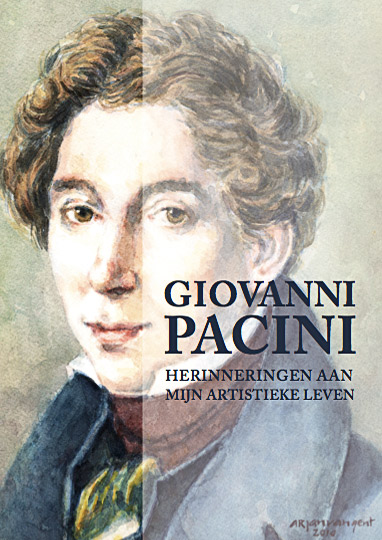
Giovanni Pacini, herinneringen aan mijn artistieke leven
Translated and annotated by Adriaan van der Tang
Eur 21,95
233 pp
ISBN 978-90-815953-1-5

www.katani.nl
Twenty years ago I enjoyed a reputation with some people at BBC Sales. As a TV-producer at Flemish Public TV of mainly historical documentaries I could decide whom to sell to historical footage. The first time someone from BBC phoned me she said: “This is BBC Sales and I phone you to ask bla bla bla” . She was surprised when she received the answer: “I’m waiting” “Sorry, what are you waiting for ?” “For your excuses; that you are a parochial lady who doesn’t speak Dutch and doesn’t have the politeness to excuse you for that fact as I would do if I couldn’t speak the language.” This just to tell that I yield to no one in the defence of anything written in Dutch. And yet, and yet I know only too well that maybe only a few hundred people at most in Flanders and the Netherlands will be interested in “Giovanni Pacini” by Adriaan van der Tang, living in a suburb of The Hague. As his subject is so interesting, even I regret it was not published in English after all.
The book is a prime example of what nowadays is possible when one decides to publish one’s own book without the assistance of a publisher: clear print, very readable type of letter, good illustrations. In short, agreeable to read. The book is not a classical biography. Mr. Van der Tang decided to translate Pacini’s “Le Mie Memorie Artistiche” and he added some interesting footnotes on each page plus a big amount of them at the end of the text. In an after word of 40 pages he comments on these memoirs. He adds a very updated list of Pacini’s operas, church and other music; probably the best up to now and there is a good index.
This method poses two problems. First there is the language. 19th century Italian is somewhat too flowery for our tastes and therefore, though Mr. Van der Tang did a fine job, one sometimes is somewhat distracted by the many examples of hyperbole used by the composer. The second problem is the well known fact that the memoirs are notoriously incorrect. That’s the reason Mr. van der Tang needs so much space to tell us what happened in reality, to correct mistakes in spelling, to remind us the composer was a well known womanizer and the lover of Bonaparte’s sister for a time. The author knows his stuff and at the end one has an idea of Pacini’s worth and meaning in the sharky world of Italian opera in the 19th century. And then an idea worms its way in the mind of this reviewer. Is Giovanni Pacini worth all the trouble and the labour of love ? Yes, he clearly his. He writes agreeable and gives singers every possibility to shine. He is the master of the exciting cabaletta and in all the fuzz one forgets for a moment that his melodies are somewhat generic and do not linger in your brain after you have stopped playing your CD’s. But still it is a boost to hear such nice though a little bit impersonal music instead of the well known war horses of Bellini, Donizetti, Rossini and young Verdi. Nevertheless I keep asking; did the book have to be done in this way ? I have my doubts. Mr. Van der Tang clearly knows all there is to know on the composer and I would very much have preferred him to mine these memoirs for a biography of his own. Instead of a translation of memoirs, footnotes at the bottom of the page, 41 pages of corrections and interesting additional information and 26 pages of notes at the end of the book we would have had a continuous story whereby we wouldn’t have had to turn from page 119 to page 200 to know who is who. And even though written in Dutch, such an interesting work could have been translated into English. I’m always surprised too that in many good books on half forgotten composers there is the same striking omission: the absence of a discography. For most collectors Pacini is no longer an exotic name as mostly Opera Rara and other labels as well have done a fine job (magnificent in the case of “Maria Regina d’Inghilterra”) in exhuming scores which some twenty or more years ago seemed to remain just names for eternity. Therefore I would have loved to see a list and a discussion of official recordings or even live performances. Still, for those able to read Dutch this book deepens the knowledge we already gained from Jeremy Commons’s essays for Opera Rara.
Jan Neckers